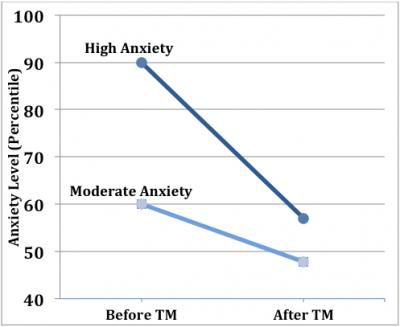
Transcendental Meditation (TM): A Treatment For Anxiety
A meta-analysis of randomized controlled trials: Transcendental Meditation shows marked efficacy in treating anxiety disorders.
Anxiety is an unpleasant state of inner turmoil, often accompanied by nervous behavior. It is the subjectively unpleasant feelings of dread over something unlikely to happen. Anxiety disorder is divided into generalized anxiety disorder, phobic disorder, and panic disorder. The emotions present in anxiety disorders range from simple nervousness to bouts of terror. The disorders were before classified as neuroses (Gelder, Mayou & Geddes, 2005).
DSM-IV criteria for anxiety disorders are: panic disorder, generalized anxiety disorder, agoraphobia without panic disorder, specific phobia, social phobia, posttraumatic stress disorder, obsessive-compulsive disorder, separation anxiety disorder.
Recent surveys have shown that as many as 18% of Americans and 14% of Europeans may be affected by one or more of them.ref

ABSTRACT
Objective: This meta-analysis of randomized controlled trials (RCTs) (That are the gold standard for a clinical trial) on the Transcendental Meditation® (TM) technique updates previous meta-analyses and assesses the effects of initial anxiety level, age, duration of practice, regularity of practice, research quality, author affiliation, and type of control group on effect sizes.
Design: This systematic review of the literature used the Comprehensive Meta-Analysis (CMA) program for core analyses of effect sizes, bias analysis, meta-regression, and moderator variable analysis. Comprehensive literature searches included databases devoted to meditation research.
Results: More than 600 TM research papers were identified; 14 of these addressed trait anxiety and reported on 16 studies among 1295 participants with diverse demographic characteristics. No adverse effects were reported. The standardized difference in mean, d, for the TM technique compared with controls receiving an active alternative treatment (10 studies) was d=-0.50 (95% CI, -.70 to -0.30; p=0.0000005). Compared with controls receiving treatment as usual (wait list or attention controls, 16 studies), d=-0.62 (95% CI, -0.82 to -0.43; p=1.37E-10). Meta-regression found that initial anxiety level, but not other variables, predicted the magnitude of reduction in anxiety (p=0.00001). Populations with elevated initial anxiety levels in the 80th to 100th percentile range (e.g., patients with chronic anxiety, veterans with post-traumatic stress disorder, prison inmates) showed larger effects sizes (-0.74 to -1.2), with anxiety levels reduced to the 53rd to 62nd percentile range. Studies using repeated measures showed substantial reductions in the first 2 weeks and sustained effects at 3 years.
Conclusion: Overall, TM practice is more effective than treatment as usual and most alternative treatments, with greatest effects observed in individuals with high anxiety. More research is needed in this area, especially with high-anxiety patients, conducted under medically supervised conditions.
doi:10.1089/acm.2013.0204
doi:10.1089/acm.2013.0204
Sean Villa, a US Army veteran, suffered from extreme post-traumatic stress after completing several tours in Iraq. He couldn’t sleep. He would wake up angry, and often go into self-destructive rages. He had trouble maintaining personal relationships.
Fortunately, Sean learned Transcendental Meditation with a scholarship from the David Lynch Foundation. After learning to meditate, Sean’s life changed – virtually overnight – for the better.
You can help thousands of veterans like Sean gain a life-changing tool for peace and healing.
Sean, like so many veterans, learned Transcendental Meditation because of the generosity of people like you. With your help, these men and women are able to access a simple, highly effective, lifelong tool to reduce their post-traumatic stress symptoms.
Please show your commitment to helping veterans like Sean.
Your support makes an incredible difference in the lives of veterans and their families. Thank you!




